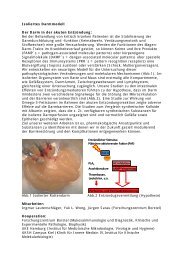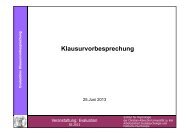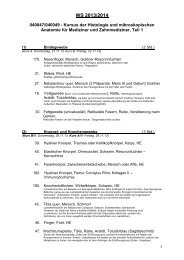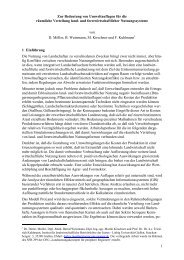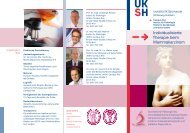European Resuscitation Council Guidelines for Resuscitation 2010 ...
European Resuscitation Council Guidelines for Resuscitation 2010 ...
European Resuscitation Council Guidelines for Resuscitation 2010 ...
You also want an ePaper? Increase the reach of your titles
YUMPU automatically turns print PDFs into web optimized ePapers that Google loves.
F.K. Lippert et al. / <strong>Resuscitation</strong> 81 (<strong>2010</strong>) 1445–1451 1449<br />
tive by the patient, or permission can be given immediately by the<br />
relative. The management of resuscitation can be taught using scenarios<br />
with manikins and simulators or animal models, but training<br />
in certain skills required during resuscitation is difficult. There<strong>for</strong>e<br />
the question arises as to whether it is ethically and morally appropriate<br />
to undertake training and practice on the living or the dead.<br />
There is a wide diversity of opinion on this matter. 98,99 Many, particularly<br />
those in the Islamic nations, find the concept of any skills<br />
training and practice on the recently dead completely unacceptable<br />
because of an innate respect <strong>for</strong> the deceased. Others will<br />
accept the practice of non-invasive procedures that do not leave<br />
a mark; and some accept that any procedure may be learned on<br />
the dead body with the justification that the learning of skills is<br />
paramount <strong>for</strong> the well being of future patients. One option is to<br />
request in<strong>for</strong>med consent <strong>for</strong> the procedure from the relative of<br />
the deceased. It is advised that healthcare professionals learn local<br />
and hospital policies regarding this issue and follow the established<br />
policy.<br />
Summary<br />
Sudden unexpected cardiac arrest is a global challenge. Some<br />
deaths are preventable and some arrests can be treated successfully<br />
and result in a very good long-term outcome. However, most<br />
resuscitation attempts are futile and death is inevitable. End-of-life<br />
decision is an important part of resuscitation.<br />
Scientific evidence does not provide much guidance <strong>for</strong> endof-life-decisions.<br />
Nevertheless, because of the importance of the<br />
subject, the ERC has produced this guidance on this important<br />
and difficult topic <strong>for</strong> healthcare providers. End-of-life decisions<br />
are complex and may be influenced by individual, international<br />
and local cultural, legal, traditional, religious, social and economic<br />
factors. Solutions should be tailored accordingly. Sometimes the<br />
decisions can be made in advance, but often these difficult decisions<br />
have to be made in an emergency and based upon limited in<strong>for</strong>mation.<br />
There<strong>for</strong>e it is important that healthcare providers understand<br />
the principles involved, the challenges and the need <strong>for</strong> research<br />
in resuscitation. End-of-life decisions and ethical considerations<br />
should be reflected in advance through education, discussions and<br />
debriefings <strong>for</strong> health care professionals to further strengthen individual<br />
ethical competence.<br />
Acknowledgement<br />
This section is dedicated in honour of the late Peter J.F. Baskett,<br />
who was the previous and original author of these guidelines on<br />
ethics 100 .<br />
References<br />
1. Baskett PJ, Lim A. The varying ethical attitudes towards resuscitation in Europe.<br />
<strong>Resuscitation</strong> 2004;62:267–73.<br />
2. da Costa DE, Ghazal H, Al Khusaiby S. Do not resuscitate orders and ethical<br />
decisions in a neonatal intensive care unit in a Muslim community. Arch Dis<br />
Child Fetal Neonatal Ed 2002;86:F115–9.<br />
3. Richter J, Eisemann M, Zgonnikova E. Doctors’ authoritarianism in end-of-life<br />
treatment decisions. A comparison between Russia, Sweden and Germany. J<br />
Med Ethics 2001;27:186–91.<br />
4. De Leeuw R, Cuttini M, Nadai M, et al. Treatment choices <strong>for</strong> extremely preterm<br />
infants: an international perspective. J Pediatr 2000;137:608–16.<br />
5. Sprung CL, Cohen SL, Sjokvist P, et al. End-of-life practices in <strong>European</strong> intensive<br />
care units: the ethicus study. JAMA 2003;290:790–7.<br />
6. Ho NK. Decision-making: initiation and withdrawing life support in the<br />
asphyxiated infants in developing countries. Singapore Med J 2001;42:402–5.<br />
7. Cuttini M, Nadai M, Kaminski M, et al. End-of-life decisions in neonatal intensive<br />
care: physicians’ self-reported practices in seven <strong>European</strong> countries.<br />
Lancet 2000;355:2112–8.<br />
8. Konishi E. Nurses’ attitudes towards developing a do not resuscitate policy in<br />
Japan. Nursing Ethics 1998;5:218–27.<br />
9. Muller JH, Desmond B. Ethical dilemmas in a cross-cultural context. A Chinese<br />
example. West J Med 1992;157:323–7.<br />
10. Edgren E. The ethics of resuscitation, differences between Europe and the<br />
USA—Europe should not adopt American guidelines without debate. <strong>Resuscitation</strong><br />
1992;23:85–90.<br />
11. Bülow H-H, Sprung C, Reinhart K, et al. The world’s major religions’ points<br />
of viewon end-of-life decisions in the intensive care unit. Intens Care Med<br />
2008;34:423–30.<br />
12. Beauchamp TL, Childress J. Principles of biomedical ethics. 6th ed. Ox<strong>for</strong>d:<br />
Ox<strong>for</strong>d University Press; 2008.<br />
13. Association WM.Declaration of Helsinki Ethical principles <strong>for</strong> medical research<br />
involving human subjects adopted by the 18th WMA General Assembly<br />
Helsinki, Finland, June 1964 and amended at the 29th, 35th, 41st, 48th, 52nd,<br />
55th and 59th WMA Assemblies. Helsinki: World Medical Association; 1964.<br />
14. Shuster M, Billi JE, Bossaert L, et al. International consensus on cardiopulmonary<br />
resuscitation and emergency cardiovascular care science<br />
with treatment recommendations. Part 4: Conflict of interest management<br />
be<strong>for</strong>e, during, and after the <strong>2010</strong> International Consensus<br />
Conference on Cardiopulmonary <strong>Resuscitation</strong> and Emergency Cardiovascular<br />
Care Science With Treatment Recommendations. <strong>Resuscitation</strong> <strong>2010</strong>;<br />
doi:10.1016/j.resuscitation.<strong>2010</strong>.08.024, in press.<br />
15. Sans S, Kesteloot H, Kromhout D. The burden of cardiovascular diseases<br />
mortality in Europe. Task Force of the <strong>European</strong> Society of Cardiology on<br />
Cardiovascular Mortality and Morbidity Statistics in Europe. Eur Heart J<br />
1997;18:1231–48.<br />
16. Atwood C, Eisenberg MS, Herlitz J, Rea TD. Incidence of EMS-treated out-ofhospital<br />
cardiac arrest in Europe. <strong>Resuscitation</strong> 2005;67:75–80.<br />
17. Nichol G, Aufderheide TP, Eigel B, et al. Regional systems of care <strong>for</strong> outof-hospital<br />
cardiac arrest: a policy statement from the American Heart<br />
Association. Circulation <strong>2010</strong>;121:709–29.<br />
18. Organisation WH. World Health Report 2002; 2002.<br />
19. Organisation WH. Global status report on road safety 2009.<br />
20. Organisation WH. WHO World Health Statistics 2009 and <strong>2010</strong>; 2009.<br />
21. Black RE, Cousens S, Johnson HL, et al. Global, regional, and national causes of<br />
child mortality in 2008: a systematic analysis. Lancet <strong>2010</strong>;375:1969–87.<br />
22. Layon AJ, Modell JH. Drowning: update 2009. Anesthesiology 2009;110:<br />
1390–401.<br />
23. Moulaert VRMP, Verbunt JA, van Heugten CM, Wade DT. Cognitive impairments<br />
in survivors of out-of-hospital cardiac arrest: a systematic review. <strong>Resuscitation</strong><br />
2009;80:297–305.<br />
24. Holler NG, Mantoni T, Nielsen SL, Lippert F, Rasmussen LS. Long-term survival<br />
after out-of-hospital cardiac arrest. <strong>Resuscitation</strong> 2007;75:23–8.<br />
25. van Alem AP, de Vos R, Schmand B, Koster RW. Cognitive impairment in survivors<br />
of out-of-hospital cardiac arrest. Am Heart J 2004;148:416–21.<br />
26. Bunch TJ, White RD, Gersh BJ, et al. Long-term outcomes of out-of-hospital<br />
cardiac arrest after successful early defibrillation. N Engl J Med 2003;348:<br />
2626–33.<br />
27. Nichol G, Stiell IG, Hebert P, Wells GA, Vandemheen K, Laupacis A. What is the<br />
quality of life <strong>for</strong> survivors of cardiac arrest? A prospective study. Acad Emerg<br />
Med 1999;6:95–102.<br />
28. Stiell I, Nichol G, Wells G, et al. Health-related quality of life is better <strong>for</strong> cardiac<br />
arrest survivors who received citizen cardiopulmonary resuscitation. Circulation<br />
2003;108:1939–44.<br />
29. Granja C, Cabral G, Pinto AT, Costa-Pereira A. Quality of life 6-months after<br />
cardiac arrest. <strong>Resuscitation</strong> 2002;55:37–44.<br />
30. Lettieri C, Savonitto S, De Servi S, et al. Emergency percutaneous coronary intervention<br />
in patients with ST-elevation myocardial infarction complicated by<br />
out-of-hospital cardiac arrest: early and medium-term outcome. Am Heart J<br />
2009;157:569–75, e1.<br />
31. Tiainen M, Poutiainen E, Kovala T, Takkunen O, Happola O, Roine RO. Cognitive<br />
and neurophysiological outcome of cardiac arrest survivors treated with<br />
therapeutic hypothermia. Stroke 2007;38:2303–8.<br />
32. Graf J, Muhlhoff C, Doig GS, et al. Health care costs, long-term survival, and<br />
quality of life following intensive care unit admission after cardiac arrest. Crit<br />
Care 2008;12:R92.<br />
33. Horsted TI, Rasmussen LS, Meyhoff CS, Nielsen SL. Long-term prognosis after<br />
out-of-hospital cardiac arrest. <strong>Resuscitation</strong> 2007;72:214–8.<br />
34. Saner H, Borner Rodriguez E, Kummer-Bangerter A, Schuppel R, von Planta M.<br />
Quality of life in long-term survivors of out-of-hospital cardiac arrest. <strong>Resuscitation</strong><br />
2002;53:7–13.<br />
35. O’Reilly SM, Grubb NR, O’Carroll RE. In-hospital cardiac arrest leads to chronic<br />
memory impairment. <strong>Resuscitation</strong> 2003;58:73–9.<br />
36. Lundgren-Nilsson A, Rosen H, Hofgren C, Sunnerhagen KS. The first year after<br />
successful cardiac resuscitation: function, activity, participation and quality of<br />
life. <strong>Resuscitation</strong> 2005;66:285–9.<br />
37. Iwami T, Kawamura T, Hiraide A, et al. Effectiveness of bystander-initiated<br />
cardiac-only resuscitation <strong>for</strong> patients with out-of-hospital cardiac arrest. Circulation<br />
2007;116:2900–7.<br />
38. Peberdy MA, Kaye W, Ornato JP, et al. Cardiopulmonary resuscitation of adults<br />
in the hospital: a report of 14720 cardiac arrests from the National Registry of<br />
Cardiopulmonary <strong>Resuscitation</strong>. <strong>Resuscitation</strong> 2003;58:297–308.<br />
39. Deakin CD, Nolan JP, Soar J, et al. <strong>European</strong> <strong>Resuscitation</strong> <strong>Council</strong> <strong>Guidelines</strong><br />
<strong>for</strong> <strong>Resuscitation</strong> <strong>2010</strong>. Section 4. Adult Advanced Life Support. <strong>Resuscitation</strong><br />
<strong>2010</strong>;81:1305–52.



